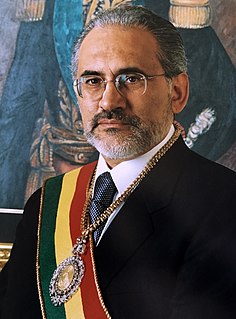A Quote by Franklin D. Roosevelt
The duty of the State toward the citizen is the duty of the servant to its master.... One of the duties of the State is that of caring for those of its citizens who find themselves the victims of such adverse circumstances as makes them unable to obtain even the necessities for mere existence without the aid of others.... To these unfortunate citizens aid must be extended by government--not as a matter of charity but as a matter of social duty.
Related Quotes
I regard the state of which I am a citizen as a public utility, like the organization that supplies me with water, gas, and electricity. I feel that it is my civic duty to pay my taxes as well as my other bills, and that it is my moral duty to make an honest declaration of my income to the income tax authorities. But I do not feel that I and my fellow citizens have a religious duty to sacrifice our lives in war on behalf of our own state, and, a fortiori, I do not feel that we have an obligation or a right to kill and maim citizens of other states or to devastate their land.
Some things the legislator must find ready to his hand in a state, others he must provide. And therefore we can only say: May our state be constituted in such a manner as to be blessed with the goods of which fortune disposes (for we acknowledge her power): whereas virtue and goodness in the state are not a matter of chance but the result of knowledge and purpose. A city can be virtuous only when the citizens who have a share in the government are virtuous, and in our state all the citizens share in the government.
Every man and woman in society has one big duty. That is, to take care of his or her own self. This is a social duty. For, fortunately, the matter stands so that the duty of making the best of one's self individually is not a separate thing from the duty of filling one's place in society, but the two are one, and the latter is accomplished when the former is done
If I was wrong in yielding to persuasion once, remember that it was to persuasion exerted on the side of safety, not of risk. When I yielded, I thought it was to duty; but no duty could be called in aid here. In marrying a man indifferent to me, all risk would have been incurred and all duty violated.
Now the good of political life is a great political good. It is not a secular good specified by a comprehensive doctrine like those of Kant or Mill. You could characterize this political good as the good of free and equal citizens recognizing the duty of civility to one another: the duty to give citizens public reasons for one's political actions.
In the first place, the church can ask the state whether its actions are legitimate and in accordance with its character as state, i.e., it can throw the state back on its responsibilities. Secondly, it can aid the victims of state action. The church has an unconditional obligation to the victims of any ordering of society, even if they do not belong to the Christian community. The third possibility is not just to bandage the victims under the wheel, but to put a spoke in the wheel itself.
Kant does not think there is anything wrong with being beneficent from sympathy. He thinks we have a duty to cultivate sympathetic feelings by participating in the situations of others and acquiring an understanding of them. He thinks we also have a duty to make ourselves into the kind of person for whom the recognition that something is our duty would be a sufficient incentive to do it (if no other incentives were available to us). That's what he means by "the duty to act from the motive of duty".
If the state cannot be entirely composed of good men, and yet each citizen is expected to do his own business well, and must therefore have virtue, still inasmuch as all the citizens cannot be alike, the virtue of the citizen and of the good man cannot coincide. All must have the virtue of the good citizen - thus, and thus only, can the state be perfect; but they will not have the virtue of a good man, unless we assume that in the good state all the citizens must be good.
If the citizens neglect their duty and place unprincipled men in office, the government will soon be corrupted . . . . If a republican government fails to secure public prosperity and happiness, it must be because the citizens neglect the Divine commands, and elect bad men to make and administer the laws.

































